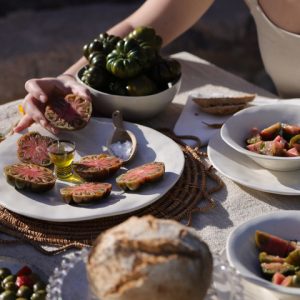NatureSweet Introduces Adora Heirloom Tomato
 NatureSweet, North America’s largest vertically integrated controlled-environment agricultural company and the number one snacking tomato brand is proud to introduce its award-winning Adora Heirloom Tomato to select stores. This unique tomato redefines the taste, appearance, and texture of tomatoes. Adora is a tomato like no other and has earned the ultimate recognition, the Crystal Taste Award, a prestigious distinction given to products by world class chefs with the International Taste Institute that achieved the 3-star Superior Taste Award for three consecutive years. Adora consistently won the award in 2021, 2022, and 2023.
NatureSweet, North America’s largest vertically integrated controlled-environment agricultural company and the number one snacking tomato brand is proud to introduce its award-winning Adora Heirloom Tomato to select stores. This unique tomato redefines the taste, appearance, and texture of tomatoes. Adora is a tomato like no other and has earned the ultimate recognition, the Crystal Taste Award, a prestigious distinction given to products by world class chefs with the International Taste Institute that achieved the 3-star Superior Taste Award for three consecutive years. Adora consistently won the award in 2021, 2022, and 2023.
Adora offers a one-of-a-kind taste experience, with a perfect balance of sweetness, subtle savory notes, and a hint of smokiness. With a Brix level higher than seven, Adora is the ideal combination of ripeness and flavor. Its high in water content (94 percent) makes it exceptionally hydrating and refreshing. The smooth transition from green to brown along its grooves signals the optimum ripening point, making it easy to identify when it’s at its peak. Renowned for its visual culinary appeal, Adora has even been called the “best heirloom tomato in the world.”
“This is a tomato like you’ve never eaten before,” says Monica Najera Morales, senior brand manager at NatureSweet. “Adora’s superior flavor can elevate any meal, transforming it from ordinary to gourmet. It’s a game changer, and there’s no coincidence that it’s the only tomato with this level of recognition.”
 In addition to its robust flavor, Adora is also rich in vitamins A and C, and an excellent source of potassium, which supports fluid balance, muscle function, and nerve signaling. Packed with antioxidants called carotenoids, Adora may help reduce blood pressure, protect against stroke, and lower the risk of chronic diseases.
In addition to its robust flavor, Adora is also rich in vitamins A and C, and an excellent source of potassium, which supports fluid balance, muscle function, and nerve signaling. Packed with antioxidants called carotenoids, Adora may help reduce blood pressure, protect against stroke, and lower the risk of chronic diseases.
Adora tomatoes comes in a 17-oz tray (7”x 3”x 2”) and will be available for a limited time at select Aldi grocery stores across the United States starting in mid-November and running through March of 2025.
NatureSweet is the single-source solution for greenhouse-grown vegetables and is the number one best-selling brand in snacking tomatoes. The largest vertically integrated controlled environment agriculture company in North America, NatureSweet guarantees great tasting produce year-round, both organic and conventional.
Its vegetables are carefully grown, harvested, and packaged by about 9,000 company Associates. NatureSweet tomatoes, cucumbers, and sweet peppers are handpicked at the peak of freshness and sold at major supermarket retailers throughout the United States, Mexico, and Canada.
NatureSweet is dedicated to having a positive social, environmental, and economic impact within our communities, and its purpose is to transform the lives of millions of agricultural workers in North America through a profitable business model that encourages other companies to replicate. Our efforts around sustainability and social impact have led us to earn B Corp, Fair Trade, and the Equitable Food Initiative (EFI) certifications.
For more news of interest to the produce industry, subscribe to Gourmet News.
Wild About Sprouts Raises Funds for Susan G. Komen
 Rä Foods, a pioneer in food tech and functional foods, recently announced that its Wild About Sprouts brand is proudly announcing its partnership with Susan G. Komen, the world’s leading breast cancer organization, to raise awareness and support the breast cancer community. This collaboration aims to raise awareness and support the fight against breast cancer while highlighting the massive health benefits of broccoli sprouts.
Rä Foods, a pioneer in food tech and functional foods, recently announced that its Wild About Sprouts brand is proudly announcing its partnership with Susan G. Komen, the world’s leading breast cancer organization, to raise awareness and support the breast cancer community. This collaboration aims to raise awareness and support the fight against breast cancer while highlighting the massive health benefits of broccoli sprouts.
One in 8 women in the United States will face a breast cancer diagnosis in their lifetime, and experts estimate that one-third of breast cancer deaths in the United States could be prevented with universal access to modern treatments.
During National Breast Cancer Awareness Month in October, all Wild About Sprouts products will feature special Susan G. Komen-branded pink packaging. This limited-time offering includes the popular 100% Broccoli Sprouts and the Alfalfa, Broccoli, and Kale blend.
Wild About Sprouts are a nutritional powerhouse. Broccoli sprouts contain sulforaphane, a natural compound studied for its potential role in supporting overall wellness and cellular health. Research suggests sulforaphane may help promote detoxification, reduce inflammation, and support the body’s natural defenses against abnormal cell growth. This partnership was created to help educate consumers on the powerful health benefits of broccoli sprouts.
Wild About Sprouts products are cultivated through the brand’s patented COLD-GROWN process, ensuring unmatched safety and freshness. Unlike traditional methods, Wild About Sprouts® products are grown inside their packaging, remaining untouched until harvested by the consumer—guaranteeing maximum freshness and an extended shelf life.
For every 3-ounce clamshell of these products sold between October 1-31, 2024, Rä Foods will donate $0.10 to Susan G. Komen, up to a total of $10,000. Additionally, the company has pledged a guaranteed minimum donation of $5,000 to support breast cancer research, regardless of sales.
Stephanie Browder, vice president of marketing of Rä Foods, stated, “We’re honored to partner with Susan G. Komen® this October. This collaboration allows us to contribute to a crucial cause while highlighting the incredible health benefits of our sprouts. We invite our customers to join us in supporting breast cancer research with our specially marked products.”
To support breast cancer research and experience the benefits of Wild About Sprouts, you can use the store locator at www.wildaboutsprouts.com/store-locator or purchase through Instacart at www.instacart.com/store/brands/wild-about-sprouts.
For more news of interest to the produce industry, subscribe to Gourmet News.
MSU Potato Breeder Develops Reduced Sucrose Potato

Dave Douches, professor in the Department of Plant, Soil and Microbial Sciences and director of the MSU Potato Breeding and Genetics Program.
A new genetically engineered potato developed by Michigan State University potato breeder Dave Douches has been granted exemption from the biotechnology regulations placed on genetically modified products by the U.S. Department of Agriculture’s Animal and Plant Health Inspection Service.
The Kal91.3 potato is bred from an MSU potato variety named Kalkaska. The newly developed potato can be stored in cool temperatures for long periods of time without sucrose, the compound that sugar is typically stored in potatoes as, converting into reducing sugars such as fructose and glucose. Without as many reducing sugars, off-color browning and caramelization can be minimized in the Kal91.3 potato, leading to healthier and higher-quality products, including potato chips.
The Kal91.3 potato can also reduce the environmental impact of the growing process without as many fertilizers and pesticides needed to maintain the potato during storage.
Sucrose is broken down in potatoes by vacuolar acid invertase, an enzyme reactive to the external environment of plants — such as temperature. Roughly 10 years ago, Jiming Jiang, an MSU Foundation Professor in the departments of Horticulture and Plant Biology, published findings on how to silence, or suppress, the gene that produces vacuolar acid invertase in potatoes.
This discovery sparked interest from Douches, a professor in the Department of Plant Soil and Microbial Sciences and director of the MSU Potato Breeding and Genetics Program, to find a way to correct the sugar imbalance that can occur in some of Michigan’s commercial chipping potatoes.
“I’ve always felt as the potato breeder at MSU that using biotechnology as a tool to improve potatoes would be worthwhile,” Douches said. “We have chipping potatoes that work well and do their job, but I wanted to take this gene and find out whether it could improve a potato that was having a problem with its sugars.
“Breeding potatoes is quite challenging because we need so many important traits to line up, but in this case, we just needed one trait to correct the problem. Using this biotech strategy, we succeeded in making a potato that was giving us problems into one that’s now commercially valuable.”
After multiple experiments carried out from 2014-2015, Douches developed an RNA interference construct that silenced vacuolar acid invertase in Kalkaska potatoes.
From 2016-2023, Douches tested the agronomic characteristics of the Kal91.3 potato and found it had a good shape, size and specific gravity — the measurement of starch content compared to water in the potato.
Historically, many farmers have stored chipping potatoes at or around 50 F to avoid vacuolar acid invertase from responding to cooler temperatures and converting sucrose into reducing sugars, but doing so has left potatoes more susceptible to storage rots and moisture loss. The Kal91.3 potato, however, has shown the ability to be stored at 40 F while maintaining its sugar balance.
“There’s a double value to it,” Douches said. “The first is that we stabilize the sugars. The invertase silencing slows down the conversion of sucrose into fructose and glucose, so it stabilizes the potato’s sugar while in storage. It’s settling the potato down from a metabolism point of view. The second is that we benefit from being able to store the potato for longer periods of time at cooler temperatures.”
In January, Douches received notice from USDA APHIS that the Kal91.3 potato proved not to pose an increased plant pest risk relative to its conventionally bred counterpart, thus making it exempt from the biotech regulations USDA APHIS imposes on other genetically modified products. This news meant regulators from USDA APHIS concluded that the Kal91.3 potato could’ve otherwise been developed using traditional breeding techniques.
For more news of interest to the agriculture industry, subscribe to Gourmet News.








